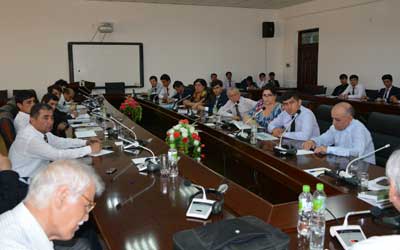News

The Formation of the Spiritual Culture of Society
On May 10, 2017 the regular meeting of the scientific and theoretical circle «Farhangdust» was held. The formation of spiritual culture of the society was considered there. The participants of the circle discussed the problems of development of socio-political culture of the society.
Professor Gulomjon Mirzoev, opened the work of the circle and noted that spiritual culture is a set of formed elements. The spiritual culture is a multi-layered formation that includes the culture of life in the city, political, spiritual, cognitive, moral, artistic, legal, and other cultures; It is a collection of intangible elements: norms, rules, laws, spiritual values, ceremonies, rituals, symbols, myths, language, knowledge, customs. A man does not have the possibility of full knowledge of these cultures. The culture and spirituality have no limits. Professor G. Mirzoev at the end of his speech noted that the formation of spiritual culture incorporates all the branches of creative and cultural activity.
The guest of the circle, Candidate of Philosophy Komil Bekzoda, in his speech noted that a cultured person is a person who knows and respects the culture of his people, he is distinguished by his behavior, knowledge and high moral qualities.
Today Europeans in creative activity pay special attention to their personality. They, defining their achievements as the basic norms of scientific values, offer their experience gained in the process of scientific research, adherents of culture and spirituality. In our society, unfortunately, there are confrontations regarding the problems of religion, observance of traditions, etc. It is time that our intelligentsia reconsider their views on these problems and pay more attention to working with society.
In the final part of the meeting, an interesting and productive debate took place between the guests and the participants of the circle.
Khasan Boynazarov,
Lecturer of the Humanities Department

